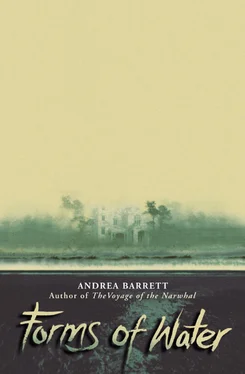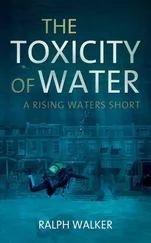“This goes on every night?” Brendan asked.
“Every night, all night. There’s one on almost every station.”
“No kidding.”
While Brendan listened, the dark road fell away before their headlights. They passed through Nelliston and Fonda and Amsterdam, East Glenville and Scotia and Niskayuna, and the road was so empty that each new set of headlights startled him. The headlights paled, the sky began to lighten, the Mohawk River appeared beneath a cloak of mist. They crossed the Hudson at Watervliet, just south of where the Mohawk poured in and around the time that a band of gold appeared on the horizon. They saw flocks of birds in Cropseyville and a few more cars and the first movements in diners and houses, and then the show was over and the news came on and then the weather.
“A gorgeous day,” the announcer said. “Clear, bright, highs in the upper seventies.” And then it was day.
The night watch had been painful for Brendan in China — arid, often despairing. His troubles had stuck in his mind like a swarm of bees, and when he sat in silent prayer the bees rose and buzzed between his ears. The sun had streamed into the cold stone church during lauds and illuminated the faces of his Chinese brethren: of Brother Anthony, who had been poisoned, and Brother Seraphim, whose head had been smashed by rocks; of Brothers Camillus and Anselm, who had died of dysentery during the march; of Brother Norbert, who had broken both legs falling off the narrow mountain trail. They were all gone, as were his companions at Our Lady of the Valley, and yet it was day, and he was alive, and he was out on the road and the sky was soft and golden. Behind Henry’s back, he made the hand signs for the names of all the brothers he could remember.
They dropped south through the Berkshire Hills and then drove east on roads that grew smaller and smaller. As they began to head north again, Brendan recognized several small towns he’d visited as a boy. They turned left, right, left again, past new houses, new schools, new shopping centers; old churches and cemeteries; women jogging with dogs who set Bongo barking; small boys tossing balls. They came to a road running, narrow and twisted and pale, like a nerve beside a river. Then, almost without warning, they turned at a stop sign and came upon a shady square that looked much as it had fifty years ago.
“Stop,” Brendan said, his voice shaking with excitement. “Stop here.”
“Is this it?”
“Almost. We’re so close I can smell it. The dam is right here in this town — this is the last one in the valley, the only one that was left. I can’t believe we got this far.”
Henry shook his head and rubbed his eyes. “I can’t either. There’s a coffee shop over there — how about I pull up and get us a little breakfast?”
“Get whatever you want. I’ll wait here with Bongo.”
Henry parked in one of the diagonal spaces fringing the square, under a horse chestnut covered with waxy blossoms. He lowered himself stiffly to the ground. “I’ll be back in five minutes. You’ll be all right?”
“Fine.” And although Brendan was as numb as a block of wood, although his eyes ached and his head throbbed and his hands were freezing, he still felt wonderful. Of course the names on the storefronts differed from those he remembered, and the big white houses surrounding the square had been cut into apartments or torn down or repainted, and of course the feed store was gone and so was the five-and-dime, but the post office was still in place and so were the Masonic Hall and the Congregational church. The square itself, with its center fountain and the wooden benches and the huge old oaks and sycamores, looked almost exactly as he’d remembered it, a cousin to the square in his vanished village.
On one of the benches near the sidewalk in front of the van, an old man was feeding pigeons. He had a big plastic sack on his lap, full of stale bread, and as Brendan watched he cast a handful of crusts around his feet. The birds, white and gray and tan and mottled, pecked at the crusts and at each other. The man threw some crusts away from the main clump of birds, toward two pigeons too shy or too young to fend for themselves, and when the other birds rushed in that direction he threw more crusts, distracting them, so that the two outsiders could eat. Then he took a bite from his own breakfast, a doughnut folded in white waxed paper.
His appetite, and his obvious enjoyment, made Brendan think back to the days when he could still eat happily. At his place in the refectory at Our Lady of the Valley, he had had a water jug, a spoon, a fork, a knife, a heavy mug, an enameled plate, and a large napkin draped over his mug. He’d eaten in silence, like the others, signing with his hands for bread or salt and listening to the low voice of the reader while he savored each mouthful. When he was done, he’d rinsed his utensils in his mug and dried them with his napkin, emptied the water from his mug into his soup bowl and dried the mug, and then draped his napkin over the mug, as it had been in the beginning. He’d given thanks for the food he’d eaten, but he’d never thought to give thanks for the desire or the ability to eat it.
Hunger had left him long ago, and now even the ability to force down food was gone, but he watched the old man and his pigeons with pleasure. The man finished his meal and scattered the rest of his crumbs. Then, to Brendan’s astonishment, he rose and made his way slowly to the van. The bench was no more than twenty feet away, but it hadn’t occurred to Brendan that, sitting with his face pressed to the window, he was as visible to the man as the man was to him.
The man wore a short-sleeved white shirt, open at the neck, and faded pants belted high on his stomach. His face was blotched with liver spots and his eyes were pale and watery. Although he looked to be about Brendan’s age, his white hair was still very thick and rose in a neat brush cut. Brendan raised a shaky hand to his own wispy strands and Bongo barked as the man tapped on the window. Brendan needed both hands to roll the window down.
“Morning,” the man said brightly. “Fine day, isn’t it?”
In his voice, Brendan heard the loneliness and eagerness for talk that had made him wheel his own chair out to the stoplight near St. Benedict’s. He wondered if this man sat on the bench each morning, snagging passersby. “It is,” he agreed.
“Couldn’t help but notice your van. You new in town?”
“Just passing through.” Brendan found it odd to be on the receiving end of one of these conversational ambushes. Imagine, he thought. A man so lonely he wants to talk to me. He made an effort to be friendly. “I used to live around here,” he said. “A long time ago.”
“Did you.” The man leaned toward the van, craning his neck for a better look at Brendan’s face. “Would you be having family here still?”
“They’re all gone,” Brendan said. “We were from Pomeroy — one of the villages that’s under the reservoir now.”
The man’s face brightened. “Hell, my family lived in Nipmuck — what’s your name?”
“Brendan Auberon.” Nipmuck had been the second village down from Pomeroy, just south of Stillwater and Stillwater Falls. He had once climbed two-thirds of the way up a horse chestnut in front of the church and seen the entire valley spread out below him. Had they cut down that tree? “My parents were Frank and Eileen Auberon,” he continued. “They had a place out Williamson Road, near the abbey.”
“Brendan? You’re Brendan? Don’t you remember me?”
Brendan couldn’t find a trace in this man of anyone he’d ever known. “Marcus O’Brian,” the man said. Brendan searched his memory.
“Your brother was the one I really knew,” Marcus explained. “Frankie and I were altar boys together, and I used to come out to your folks’ place sometimes. Frankie and I went into the service the same month. But that was later, after you took off.”
Читать дальше












